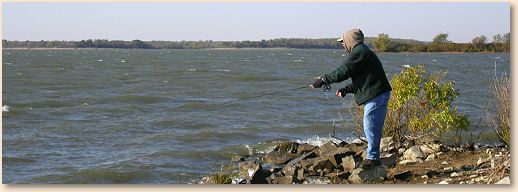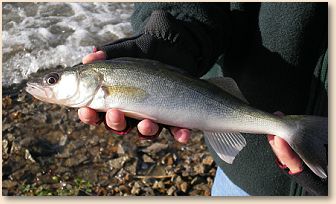|
It helps to have a wife who's a good sport when the alarm
goes off at 5:00am. We've only been married for about a
month and this whole getting up real early to go fishing
thing is not something she's used to yet. When we met two
years ago, she already fished, and during our courtship I
converted her to the fly rod, which she has taken to very
well. However, she's not a morning person so this is a new
wrinkle for her. But like I said, she's a good sport so after
a little poking and prodding, she got up and we were on our
way to the lake with a brief side trip for gas and coffee,
without which neither the truck nor Marguerite were going
far that morning.
We reached the lake just as the sun was beginning to redden
the horizon over the opposite shore. One of the reasons I
like to start at this spot and start this early is that
the sunrises this time of year are well worth taking a
little time to stop and enjoy. Besides, we were going to
be fishing the rip-rap along a bridge where the river enters
the reservoir and it was a little too dark yet to go scampering
over oftentimes loose boulders and washed up debris. So we took
our time rigging our rods and watched the sun come up. There
was a fair breeze blowing (about 10mph) that would only
strengthen as the morning went on, so I wasn't worried about
the white bass (our targets for the morning) leaving the rocks
with the increasing sunlight.
Once we were rigged up and ready to go (me with my Scierra 6wt,
Marguerite with her 5wt TFO and both armed with clouser minnows)
we hiked down to the far end of the bridge. My thinking is that
it's easier to make the hike and fish your way back towards the
truck than it is to fish your way out and trudge all the way
back later. Same number of steps, I know, but the anticipation
of fishing makes the hike easier somehow. We picked our way down
the fairly steep rock slope slowly, all the time watching the
water for signs of shad, seagulls, or fish rising to the surface
to feed. The shad were there, but nothing seemed to be feeding
on them. Oh well, I thought, whites are cruising fish, there may
be a school along any minute.
This is the type of structure that always seems to hold a few fish,
but apparently not this morning. The wind was right, the baitfish
weren't overly abundant but they were there. However after an hour
of picking our way along the rocky bank, we'd still not gotten so
much as a hit. The water was murkier than usual from some heavy
rain farther upstream, so I don't know if the fish were absent,
or maybe they were there and just couldn't see our flies. Either
way, after another half hour, we decided to find a spot a little
farther down the impoundments where the water should be a little
clearer, and the walking a little easier.
Our next stop was a series of points and shallow bays about
halfway down the lake. By this time the sun was up and not a
cloud in the sky, which would normally make shallow water not
as good a choice. The wind, though, had also risen and there
were white-caps rolling in across the bays and breaking against
the points. My thought was that the waves would force baitfish
into the shore and kick crayfish and other food items loose from
the rocky areas along the shore. The wind was up to about 20mph
and blowing straight into the points, not exactly anybody's idea
of premium casting conditions. Marguerite decided at that point
it might be safer for all concerned if she went to spinning gear.
I went to an intermediate sinking line hoping the extra weight
would both allow me to push a little more line out into the wind
and keep the fly below the swells.

This time my instincts were dead on, and after about five minutes
I looked over and Marguerite's spinning rod was bent double and
she was into a nice white bass. I stopped and watched her land it,
remembering a time not so long ago when she would have needed me to
help unhook it and return it to the water. Not so anymore and she
handled the job just fine on her own. The look on her face when
she's catching fish reminds me of when I was just starting out
(more years ago than we'll talk about, thank you) and reminds me
it doesn't have to be any different now. It was all going to be
chuck and duck for me with the 6wt., so I went from the #2 clouser
minnow I'd been trying to throw earlier to a #6 in brown over orange.
That way I had baitfish action combined with crawfish coloration,
hopefully a one-two punch. Sure enough, a few casts later I was
into a fish myself. Mine wasn't quite as big as the two my wife
had by then landed, but I'm getting used to the odd habit she's
lately developed of catching bigger fish than I.

After that we settled into a pattern: she could cast the quarter oz.
lure she was using farther than I could a fly, so she fished the
bays between the points while I got out on the ends of the rocky
points where I could reach a little deeper water more easily. Pods
of fish were cruising the shoreline anywhere from 15 to 40 feet
from the bank. Lucky for me they were moving closer yet as they
came around the points and the 25 feet or so of line I was able
to shove into the wind was more than sufficient. First Marguerite
would start catching fish as they would cruise by her, then a few
minutes later I would start catching them. That would go on for a
while, then the pod would move on and we would have to wait for
another school to come in.

A school of whites isn't quite the organized hunting machine that
a school of wipers can be so you don't as often see the bait balls
on the surface, so it's more a matter of keeping your fly in the
water and either moving until you find them, or sticking in one
spot until they find you. When they are feeding like this, color
and size of fly is less important than how it moves. It's almost
not possible to strip a streamer fast enough sometimes and a slow
moving fly will often not trigger the vicious strikes that make
these fish so fun.
White bass aren't the only fish that take advantage of these
conditions to feed. The lake we were fishing also has fair
populations of crappie, drum, walleye, and smallmouth bass,
all of which are possibilities on a fly. During a lull in
the white bass action I picked up a walleye and a smallmouth,
both on that same crayfish colored clouser.

As noon approached, the action slowed down a bit, which was
probably just as well since Marguerite had to be at work that
afternoon and we had a good hour's drive home (she works from
the house so we could cut it pretty close). I lost track of
how many fish were caught altogether, but we had doubles on
at several points, and there was never too much time passed
between hook-ups once we found the right spot. The big thing
though, was that we had an all too rare day when we could both
be together catching fish and enjoying what turned out to be a
beautiful, if somewhat windy day. ~ Tim Giger
|





